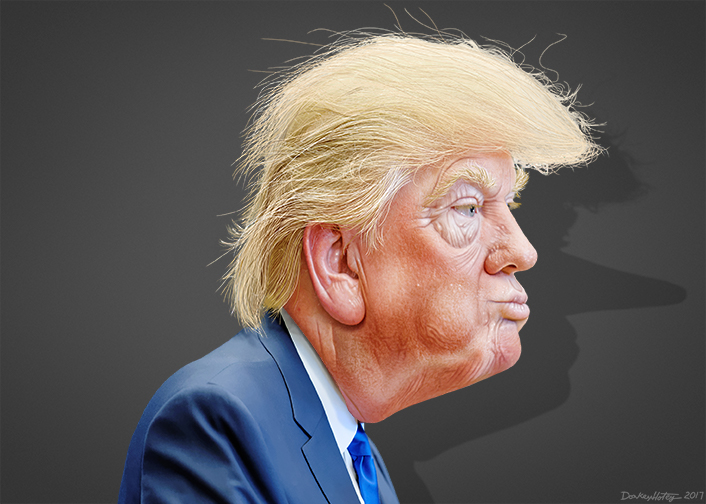This post is also available in Dutch .
Some imitators and impressionists have the uncanny ability to sound exactly like the person they are imitating. Or do they? Research suggests they are more caricaturists than mimics.
American actor and comedian Alec Baldwin’s impressions of U.S. President Donald Trump are considered among the best.
Good vocal imitations are not only entertaining but also awe-inspiring; it’s unfathomable how someone can transform their voice into sounding like someone else’s. Yet closer inspection reveals that vocal imitators aren’t actually mirroring their target’s voice but rather focusing on, and sometimes even exaggerating, certain features of it. It is a lot like how a caricaturist will exaggerate features in their illustrations.
Professional vocal imitators and impersonators are like vocal caricaturists, exaggerating characteristic features of their models.
Caricature of Donald Trump by DonkeyHotey (CC BY-SA 2.0).
Caricatured imitations are easier to identify
Research suggests that caricatured imitations are more easily recognized than more accurate imitations. A group of researchers in Argentina studied this by having professional impersonators imitate public figures from memory and directly after hearing recordings of the target voices. Afterwards, people listened to both the original targets and the imitations and rated how likely they were to be real, and done by the original target speaker. They also had people rate how similar the imitations were from the target. They found that the imitations from memory were more easily identified than the imitations of the audios, while the imitations of the audios were actually rated as being more similar to the target voices.
The same has been found with vocal imitations of non-vocal sounds, such as wind blowing. Compared to auditory sketches of the sounds made with a computer, vocal imitations are just as well-recognized but acoustically not very similar. Instead, we see that imitators choose a few distinguishing features to focus on.
Professional vs. non-professional imitators
This makes sense when you think that impersonations are usually meant to be immediately recognized as their targets and to make fun of them, rather than really “passing for” them. One study that compared a professional imitator and non-professionals when impersonating former French president Jacques Chirac found that the non-professionals changed global features of their voices, whereas the professional focused on mimicking the target’s particular way of speaking. In fact, several studies have found that non-professional imitators actually tend to get acoustically closer to the target than professional imitators (when imitating from memory).
That isn’t to say that professional imitators aren’t good or couldn’t sound more like their targets. In fact, they’re a perfect example of efficient human communication. They cater to their audience, knowing just what features are most typical of their target and how much of them is necessary to “sound like” them… and to get a laugh.
Written by Monica Wagner and edited by Annelies van Nuland.
